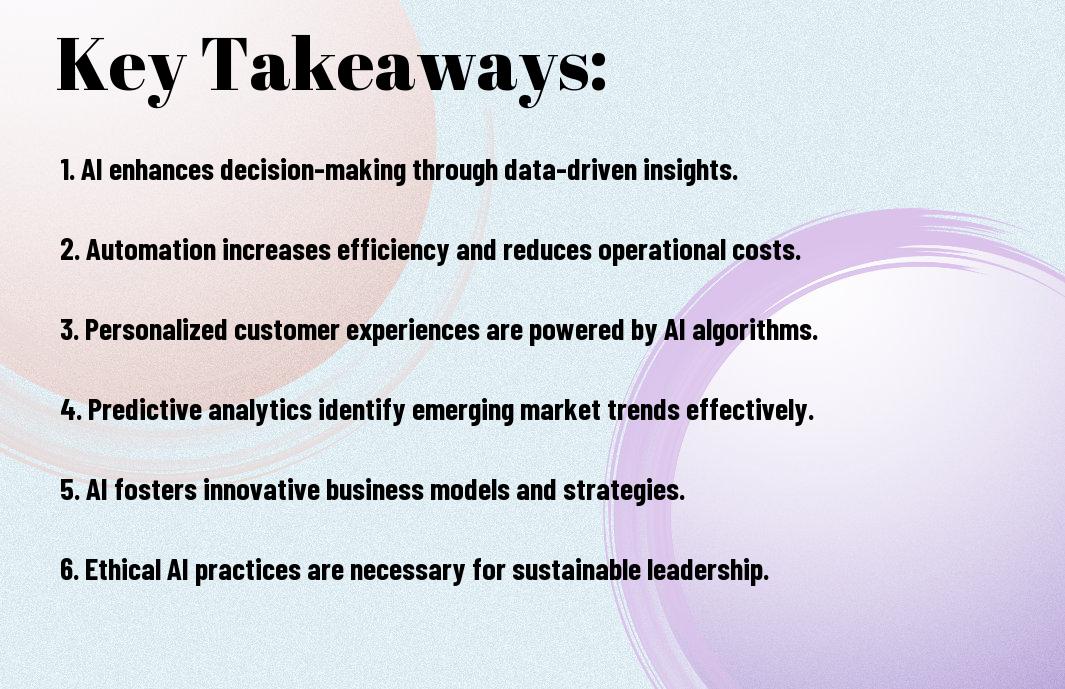As you navigate the evolving landscape of business and finance, you’re likely witnessing the profound impact of Artificial Intelligence (AI) on your industry. You may be wondering how AI will shape your future investments and leadership decisions. Your ability to adapt to AI-driven changes will be key to staying ahead. You will need to understand the role AI plays in transforming wealth management and business leadership to make informed decisions and drive success in this new era.
Key Takeaways:
- AI is transforming the wealth management industry by providing personalized investment advice, automating portfolio management, and enhancing risk assessment, allowing for more efficient and data-driven decision making.
- The integration of AI in business leadership is enabling companies to make more informed strategic decisions, improve operational efficiency, and drive innovation, ultimately leading to increased competitiveness and growth.
- As AI continues to evolve, it is likely to have a profound impact on the future of work, with business leaders needing to develop new skills and adapt to an environment where human and machine collaboration becomes the norm, driving a new era of productivity and prosperity.

The Algorithmic Revolution in Finance
The advent of artificial intelligence is transforming the financial landscape, and you are witnessing a significant shift in the way wealth and business leadership are managed. As AI technologies continue to evolve, you can expect more efficient and data-driven decision-making processes to emerge.
From Intuition to Data-Driven Decisions
Akin to a new era in finance, you are now relying on algorithms and machine learning to inform your investment choices, rather than solely on intuition or guesswork. This change enables you to make more informed decisions, backed by data and analysis.
The Democratization of Wealth Management
Oddly enough, you are now able to access wealth management tools and services that were previously reserved for high-net-worth individuals. This shift is enabling you to take control of your financial future, with AI-powered platforms providing personalized advice and investment strategies.
Management of your wealth is becoming increasingly streamlined, as AI-driven platforms offer you a range of services, from portfolio optimization to risk management. You can now monitor your investments in real-time, making adjustments as needed to achieve your financial goals. As you navigate this new landscape, you will find that AI is empowering you to make smarter, more informed decisions about your wealth and business leadership.

AI as the New Executive Partner
One of the most significant developments in the business world is the emergence of AI as a trusted partner for executives, enabling you to make informed decisions and drive growth in your organization.
Augmented Leadership Intelligence
The advent of AI has given you access to augmented leadership intelligence, allowing you to analyze vast amounts of data and make strategic decisions that propel your business forward.
The Cognitive Partnership Paradigm
Paradigm shifts in business are often driven by technological advancements, and the cognitive partnership paradigm is no exception, as you begin to collaborate with AI systems to achieve your goals.
Consequently, as you research deeper into the cognitive partnership paradigm, you will discover that AI is not only a tool, but an integral part of your decision-making process, providing you with actionable insights and enabling you to respond to changing market conditions with agility and precision, thereby giving you a competitive edge in the market.
The Wealth Gap Paradox
Your understanding of the wealth gap paradox is crucial in navigating the future of wealth and business leadership, as AI continues to shape the economic landscape, creating new opportunities and challenges for you to consider.
Technology as Equalizer or Divider
One of the key questions you face is whether technology will act as an equalizer, providing access to new opportunities, or a divider, exacerbating existing inequalities, and it’s up to you to stay informed and adapt to the changing landscape.
Navigating the New Economic Landscape
Behind the scenes, AI is transforming the way you do business, and it’s crucial to understand these changes to make informed decisions about your investments and leadership strategies, taking into account the potential risks and benefits of this new landscape.
For instance, as you navigate this new economic landscape, you’ll need to consider how AI-driven automation and job displacement may impact your workforce and your business model, and how you can leverage AI to create new opportunities for growth and innovation, ultimately shaping the future of your wealth and business leadership.
Reimagining Corporate Structure
Keep in mind that AI is transforming the way you approach corporate structure, enabling more agile and adaptable organizations. You will need to consider how AI can help your business thrive in a rapidly changing environment.
Flattening Hierarchies Through AI
Against traditional top-down management, AI-driven tools are empowering you to make more informed decisions and collaborate more effectively across departments, leading to a more streamlined and efficient organization.
The Rise of Hybrid Decision Models
Alongside human intuition, AI-powered decision-making is becoming increasingly prevalent, allowing you to leverage data-driven insights to inform your strategic choices and drive business growth.
It is likely that you will see significant benefits from adopting hybrid decision models, as they enable you to combine the strengths of human judgment with the analytical power of AI, resulting in more accurate and effective decision-making. You can expect to see improved outcomes and increased competitiveness in your industry as you integrate AI into your decision-making processes.
Ethical Dimensions of AI-Driven Wealth
Once again, as you consider the impact of AI on wealth and business leadership, you must examine the ethical implications. You can learn more about How artificial intelligence is reshaping the financial services industry and its effects on your business.
Algorithmic Bias in Financial Systems
By analyzing the data used to train AI systems, you can identify potential biases that may affect your financial decisions. You should be aware of these biases to make informed choices.
Balancing Profit and Responsibility
Along with the benefits of AI, you must consider the social and environmental impacts of your business decisions. You need to balance your pursuit of profit with your responsibility to your stakeholders and the community.
Bias in AI systems can have significant consequences for your business and the people it affects. As you implement AI-driven solutions, you should prioritize fairness and transparency to maintain trust and avoid potential backlash. You can achieve this by regularly auditing your AI systems and addressing any biases that you find.
The Human Element in an Automated World
Many leaders are recognizing the importance of balancing technology with human skills to succeed in the future of wealth and business leadership. You will need to adapt to an environment where AI and automation are increasingly prevalent, and your ability to leverage human strengths will be key to your success.
Emotional Intelligence as Competitive Advantage
Around the globe, you are seeing a shift towards valuing emotional intelligence as a key differentiator in the business world. You will need to develop your emotional intelligence to effectively lead and make decisions that drive your organization forward in an increasingly automated landscape.
Building Trust in the Age of Algorithms
Against the backdrop of increasing automation, you are likely wondering how to build trust with your stakeholders. You will need to prioritize transparency and accountability in your decision-making processes to establish trust and credibility in a world where algorithms are making more and more decisions.
Competitive businesses are those that can balance the efficiency of algorithms with the empathy and understanding of human leaders. You will need to focus on building trust by being open about how your organization uses data and algorithms, and by demonstrating a commitment to ethical decision-making. This will help you establish a strong foundation for your business and drive long-term success.
Summing up
With this in mind, you can see how AI is revolutionizing your approach to wealth and business leadership. As you navigate this new landscape, your ability to adapt and innovate will be key to success. You will need to harness the power of AI to drive your business forward, and your leadership style will need to evolve to maximize its potential, ultimately transforming your organization and securing your place in the future.
FAQ
Q: What role is AI playing in transforming the wealth management industry?
A: AI is revolutionizing the wealth management industry by providing personalized investment advice, automating portfolio management, and enhancing risk analysis. With the help of machine learning algorithms, AI can analyze vast amounts of data, identify patterns, and make predictions, enabling wealth managers to make informed decisions. Additionally, AI-powered chatbots are being used to provide 24/7 customer support, improving client engagement and experience.
Q: How is AI impacting business leadership and decision-making processes?
A: AI is significantly impacting business leadership by providing data-driven insights, enhancing predictive analytics, and optimizing operational efficiency. AI-powered tools can analyze large datasets, identify trends, and provide recommendations, enabling business leaders to make informed decisions. Moreover, AI can help leaders identify potential risks and opportunities, allowing them to develop strategic plans and stay ahead of the competition.
Q: What are the potential benefits of AI adoption in the business world?
A: The potential benefits of AI adoption in the business world are numerous. AI can help businesses increase efficiency, reduce costs, and enhance customer experience. AI-powered automation can streamline processes, freeing up resources for more strategic and creative work. Additionally, AI can help businesses gain a competitive edge by providing real-time insights, improving forecasting, and enabling data-driven decision-making.
Q: How can business leaders prepare their organizations for an AI-driven future?
A: Business leaders can prepare their organizations for an AI-driven future by investing in AI education and training, developing an AI strategy, and building a culture of innovation. They should also focus on data quality and governance, ensuring that their organizations have the necessary infrastructure to support AI adoption. Furthermore, leaders should encourage experimentation, collaboration, and continuous learning, fostering a mindset that is open to new technologies and willing to adapt to changing circumstances.
Q: What are the potential risks and challenges associated with AI adoption in wealth and business leadership?
A: The potential risks and challenges associated with AI adoption in wealth and business leadership include job displacement, bias in AI decision-making, and cybersecurity threats. As AI automates certain tasks, there is a risk that some jobs may become obsolete. Additionally, AI algorithms can perpetuate existing biases if they are trained on biased data, leading to unfair outcomes. Moreover, AI systems can be vulnerable to cyber attacks, compromising sensitive data and disrupting business operations. To mitigate these risks, business leaders must prioritize transparency, accountability, and ethics in AI development and deployment.



